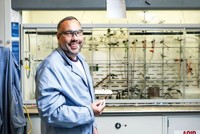Advertisement
Grab your lab coat. Let's get started
Welcome!
Welcome!
Create an account below to get 6 C&EN articles per month, receive newsletters and more - all free.
It seems this is your first time logging in online. Please enter the following information to continue.
As an ACS member you automatically get access to this site. All we need is few more details to create your reading experience.
Not you? Sign in with a different account.
Not you? Sign in with a different account.
ERROR 1
ERROR 1
ERROR 2
ERROR 2
ERROR 2
ERROR 2
ERROR 2
Password and Confirm password must match.
If you have an ACS member number, please enter it here so we can link this account to your membership. (optional)
ERROR 2
ACS values your privacy. By submitting your information, you are gaining access to C&EN and subscribing to our weekly newsletter. We use the information you provide to make your reading experience better, and we will never sell your data to third party members.
People
Daniel Mindiola
Mentorship helped this ACS Scholar climb from welfare recipient to Ivy League professor
by Linda Wang
January 26, 2015
| A version of this story appeared in
Volume 93, Issue 4

Growing up in Venezuela, Daniel J. Mindiola never imagined he would one day become a tenured chemistry professor at a university in the U.S., let alone an Ivy League institution. In fact, going into the sciences had not yet crossed his mind; he had wanted to become a professional soccer player.
Today, Mindiola is Presidential Professor of Chemistry at the University of Pennsylvania, and his cutting-edge research on organometallic chemistry has garnered numerous awards and honors, including a special visit to the White House.
Mindiola’s life took a sharp turn at the age of 15, when he and his mother moved from Venezuela to the U.S. to avoid the deep political and economic turmoil that had embroiled his home country.

Mindiola and his mother arrived in the U.S. with only $200 and stayed with his uncle in the small farming town of Ovid, Mich. “The idea was for my mother to work and for me to finish high school and then go back to Venezuela,” Mindiola says. His father and a sister stayed behind in Venezuela, while an older brother was serving in the U.S. Navy. Another brother and sister were studying at Ohio State University.
His mother struggled to find work, and they lived on welfare checks and food stamps. “Those first two years were probably the most difficult years of my life,” Mindiola says. His mother eventually found a job delivering newspapers.
Mindiola did poorly during his first semester at Ovid-Elsie High School, earning a 0.5 GPA. “It was a wake-up call that I really had to work hard to do well,” he says. “I would spend a lot of hours at night trying to catch up with the rest of the class, especially in English.”
At the same time, he needed to supplement the family’s income. He remembers milking cows at 4 AM and then going to school at 8 AM. When he wasn’t working on the farm, he was delivering newspapers with his mother. Though he earned less than minimum wage, he kept reassuring himself, saying, “I’m going to get through this, and things are going to get better.”
Things did get better. His high school chemistry teacher, Jack Nutter, noticed that Mindiola was struggling in class, so he pulled him aside and suggested they meet for an hour every day to work on chemistry problems. Mindiola’s confidence soared, and by the time he graduated, his overall GPA was 3.5.
At Michigan State University, he continued to work to support himself. During his first semester, he worked at a restaurant from 3 PM to 3 AM and had classes from 8 AM to noon. “Somehow, I managed to do homework between noon and 1 PM, and then I would take a nap before going back to work,” he says.
He took chemistry during the second semester of freshman year, and that’s when he met chemistry professor Kim Dunbar, who would become his research adviser. “The first day I saw her give a lecture, I knew chemistry would be my major,” Mindiola says. Dunbar took him into her research group and paid him a small stipend so that he didn’t have to work at the restaurant. “That really helped because I could focus on the chemistry,” he says. “After that, the pieces of the puzzle started putting themselves together.”
By senior year, Mindiola was publishing several research papers, and “I was almost like another grad student.” It was also during his senior year that Mindiola received a $5,000 fellowship as an ACS Scholar. “The stipend helped keep me in the lab rather than look for jobs elsewhere,” he says.
Mindiola earned a B.S. in chemistry with honors from Michigan State in 1996 and a Ph.D. from Massachusetts Institute of Technology in 2000. He became the first ACS Scholar to earn a Ph.D.
After graduating, he worked as a postdoc at the University of Chicago until 2002. That year, he was hired as an assistant professor of chemistry at Indiana University, Bloomington. By 2010, he was a full professor.
In 2013, he joined the faculty at UPenn, where he’s researching the role of base metals in converting natural resources such as natural gas into more value-added products.
Looking back at his life and career, Mindiola says his early experiences have instilled in him a strong work ethic and the determination to never give up. “When things aren’t moving along the way you wish, that’s usually when you learn the most,” he says.
He credits many people with his success, and he is now giving back as a mentor himself. “We need to help those diamonds in the rough and give them that extra push to get up,” he says. “Several people did that for me, and I am really thankful.”
The ACS Scholars Program awards renewable scholarships to underrepresented minority students who want to enter chemistry or chemistry-related fields. For more information, go to http://www.acs.org/success.




Join the conversation
Contact the reporter
Submit a Letter to the Editor for publication
Engage with us on Twitter